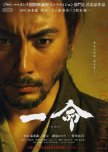
In this review, I will compare both versions but I will also review this film for its own merits to those who don’t want to bother with the original although I highly advice you to watch the 1962 version. I won’t talk about history since I already mentioned it in Seppuku’s review. You just need to know that Harakiri means a ritual suicide and an honorable death for the Samurai who has to literally disembowel himself and die.
While Kobayashi’s Seppuku (aka Harakiri) was a dark revenge human samurai story, Miike’s Ichimei (aka Hara-Kiri: Death of a Samurai) was more like a dramatic view of the Samurai honor that aims for emotional engagement. Just like Miike and his screenwriter Kikumi Yamagishi explained in the press conference, this film is based on the source material, so it’s not a nihilist revenge tale like the original. It’s more about what is the true essence of the samurai moral code. I was glad to find out that the screenplay was modified comparing to the original because that’s the whole point of remaking something; not to produce a replicate.
This remake was more melodramatic than the original, it focused on family relationships and struggles to survive more than Kobayashi’s version which made it feel dramatic and touchy; I don’t even know if it’s a good or a bad thing but as I mentioned above, I truly appreciated many modifications of the screenwriting, although I was a bit disappointed with others such as the flashbacks. In the original film, they were a key element and very intriguing to pick up and follow, not to mention the smart storytelling but in this version; it felt wrong at some points. Even the narration of Motome’s story by the retainer of the Iyi clan was also flawed but the story itself was very well-done especially the suicide part. I also appreciated the presence of intensity and conflicts even in a lesser amount.
If I talk about the film itself without comparing it to the original, I would say: do not expect another “13 Assassins”. This is Miike’s follow up to the latter but they’re totally different; Hara-kiri is a Jidaigeki (historical storytelling that doesn’t focus on action and uses it in small amounts) while 13 Assassins is a Chambara (Samurai bloody films that focus on action and swordplay) so do not anticipate to see heads rolling and arms chopped off. Although Miike can do gore so well and his bloody films are well received, he actually decided to drift away from his usual dish this time and try the human melodrama and Samurai codes of honor instead. He was successful even if many people were bothered by the non-13 Assassins setting. If you only liked the latter for the action part, then I am sure that Ichimei won’t be to your liking.
The acting was good. At first, I was afraid to see Ichikawa Ebizo play the role of Tsugumo Hanshiro and being an elder to actors that are only five to seven years younger than him but I was proved wrong on that side; he did a great job with his role especially with his tone but I still insist that Tsugumo Hanshiro’s character belongs to Nakdai Tatsuya only even if Ebizo did a great job with it. Other actors were also good; Eita and Mitsushima Hikari are currently one of the best actors in Japan. The casting for this film is very smart, it doesn’t leave you room to complain a lot about the acting even if the original was full of unbeatable figures.
The characterization was a bit exaggerated and flawed since Miike wanted to humanize his characters even more than they already are. The characters were very emotionally involved in a brutal way, maybe it can be considered as a good thing but the sensations of tragedy in the original were the right amount for this human Samurai story.
Hara-Kiri: Death of a Samurai is a beautiful, attention-grabbing film if we talk about visuals. Miike is such a professional director as where to place his cameras and how to take the shots. He’s also a perfectionist when it comes to using silence as a fierce way to create intensity. The cinematography was artistically eye-catching but that doesn’t deduct any points from Kobayashi’s Harakiri even if it was produced back in 1962.
The music wasn’t as compelling as in the original. It was noticeably absent at times.
Watch this if:
-You dislike Japanese Samurai classics and want to watch something recently produced instead. If not, then you really should give Kobayashi’s masterpiece a try as soon as possible.
-You like Samurai human stories that don’t focus on action (Jidaigeki).
-You like Takashi Miike but beware that this is quite different from his other films.
-You like touching somber stories.
Do not watch if:
-You’re not a fan of remakes; just stick with the original.
-You’re expecting another 13 Assassins.
-You dislike Samurai films.
Taken as a whole, Miike’s version of Kobayashi’s massive hit is a somewhat elegant, straightforward and a dramatically faithful manner of retelling the 1962 revenge tale. It’s watchable and enjoyable despite its flaws.
Was this review helpful to you?
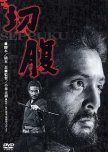
This review will probably be my longest up to date. Bear with me because I have to put this film in its right temporal and spatial frameworks before talking about the film itself. If you’re not interested in history, you can skip the first two paragraphs and get to the film’s specific review.
I am history lover so it’s a given that I studied Japanese history way before I started watching Japanese classics and that knowledge in history helped me a lot when I started exploring the golden Japanese cinema. Seppuku is set at the beginning of the Edo era (17th century), an age of peace that lasted for more than 250 years in Japan where the Samurai class gradually lost the “warrior” side of their positions since there weren’t any wars to fight. As Tokugawa (the general who established his shogunate in Edo) gained complete control over Japan; many Samurai who fought the Sekigahara battle and others were left without clans to serve and were called “Ronin” meaning masterless Samurai. They were usually viewed as bandits whether intentionally or unintentionally, they lived in poverty but they didn’t lose their “samurai nobility” that’s still a higher rank than the peasants’ class. They also never gave up on their honorable ethics and beliefs.
In that era, many Ronin’s started to visit clans to request a “Seppuku” in their clans’ yard, meaning a ritual suicide where the Samurai has to literally disembowel himself using his Shinto (the Samurai in that era has a long Sword Katana and a smaller one Shinto that he always carry around with him, they’re considered as big part of his Samurai honor). The Harakiri (ritual suicide) is in fact an honorable death for a Samurai so it was dishonorable for clans to reject such a noble request from Ronins but they also didn’t want to let them kill themselves on their property so they either hired them as their clans’ Samurai (but that didn’t happen a lot since it’s an era of peace so the clans didn’t need many Samurai considering the fact that there’s no war) or they just gave them money and sent them away. As other Ronin heard about the story, they started to frequently visit clans in order to request a Seppuku but they never actually meant to kill themselves, they just wanted to take the money and leave. And that’s what’s called “Harakiri fraud” which is a cowardly, shameful act from a Samurai even if he’s a Ronin.
The history stops there although the clan that’s mentioned in this film (The Iyi clan) is a real clan that’s known as a very important figure in modern Japanese history. Now, let’s talk about the film itself; one clan (the Iyi clan) decided to stop these Harakiri frauds and made the Samurai who asked to commit seppuku kill himself so that other Ronin won’t dare show up in front of their clan. That’s how the story starts but through flashbacks, we get the overall story of that man, where he came from and why he came. His circumstances, his situation and his life were all told using flashbacks that were amazingly illustrated in order to produce spectacular turns of events.
Seppuku is a human Samurai film that deals with old Japanese codes of honor and ethical Samurai principles. Kobayashi wanted to introduce a somewhat anti-samurai film that deals with the shortcomings of some Samurai beliefs by using quotes such as “After all, this thing we call samurai honor is ultimately nothing but a façade” (said by Tsugumo Hanshiro) but then he comes back to insist on the codes of dignity. Unlike many Kurosawa films’ I saw where he always idolizes the Samurai figure. Don’t get me wrong, Kurosawa’s films are my favorites but what I meant to say is that Kobayashi and Kurosawa’s adaptations of Samurai stories are quite different even if they’re comparable, to each his own genius ideas of making masterpieces.
The film contained the sword fighting but it wasn’t the main focus of this film. The developments were surprising and quite intriguing to follow; in this film you get a taste of suspense, psychology, action, tragedy, revenge and even family. Although the film insists on the Samurai element more than anything else, it also focuses on family relationships, interactions and sacrifices as well as human and more specifically Samurai emotions.
If I keep talking then I won’t stop praising this film’s screenwriting by Shinobu Hashimoto and the original novel by Yasuhiko Takiguchi. I appreciated every angle of the story and the way it revealed facts at the most unexpected time. This is not a film that’s set to kill a Samurai through a ritual suicide or show the audience how a Samurai disembowel himself; it’s a film that describes the human emotions and feelings behind that act. However, I do understand if some people found the development a bit slow. As for me, my eyes were glued to the big screen the whole time without a single move or sound. Yes, it had that kind of impact on me.
The acting, oh my! what on earth can I say about that acting? I am not biased or someone who talks with full subjectivity so when I say that Nakadai was marvelous in this, I am not talking with a fangirl’s emotions, I am speaking with full objectivity about a Japanese legend. For me or anyone who knows classic Japan, Nakadai Tatsuya is a legendary star in the Japanese cinema and one hell of a charismatic astounding actor who can grab your intention in a split of a second. Like many of his other roles, Nakadai was amazing in this; his portrayal of Tsugumo Hanshiro’s character was flawless. Enough said or I won’t stop talking about that man’s incredible acting skills.
Other actors were also amazing; I was moved by their acting skills. It’s the golden Japanese era of cinema so it’s a given that only high-class acting exists. The characters were very well written and their relationships were fascinating to follow, I was moved by many characters’ developments in Seppuku.
Now let me talk about that breathtaking cinematography. I like to focus on cinematography while watching films and even though this was produced in 1962 (black and white); I was charmed by the back sceneries and great settings. Kobayachi did an awesome job with those mesmerizing takes that I will never forget.
I have to mention the soundtrack which I believe it’s the best music composure I ever heard in any Japanese classic.
Watch this if:
-You like Japanese classics or want to discover them.
-You enjoy Samurai films but keep in mind that this isn’t an action film.
-You love films with human stories.
-You like Masaki Kobayashi because this is his finest work.
-You like Nakadai Tatsuya because this is one of his best performances.
Do not watch if:
-You dislike Japanese classics.
-You dislike Samurai films.
To end my super long review, I will mention that Harakiri is a crafted masterpiece by Kobayashi and an eternal gem of the Japanese classic cinema that’s bound to take you through a great journey of amazing events and astonishing acting skills.
I will leave you with two quotes by Tsugumo Hanshiro:
“What befalls others today may be your own fate tomorrow.”
“The suspicious mind conjures its own demons.”
Was this review helpful to you?

So what is this about? It’s a story about “Benri-ya” which literally means “handy men”. The two main leads are given certain jobs to accomplish and they get involved in various adventures through their clients’ requests. It’s a concept that’s not very unique since I am sure that many of you saw dramas where the main leads are “problems-solvers” where they get into contact with many characters and go through various situations to achieve their missions.
However, what shines in that episodic pattern is that our main leads don’t get involved in their clients’ lives to be sacred savers, heroes or creators of happy ever after endings. Even the side characters are Mahoro’s ordinary people and job requests don’t demand anything heroic to pull through. In this drama, the situations are handled quite realistically than any other non-detective episodic drama I saw, it deals with some of the life’s dark cases such as prostitution, stalking, AV’s, Yakuza, alcoholics, etc. I was actually surprised in a good way with its pattern.
Another point that attracted me about this drama’s screenwriting is the great slices of humor; I always appreciated Japanese style of comedy and silly hilarious situations so during this drama, I always had to pause and laugh out loud for a while.
The acting is realistic and very believable; I wouldn’t choose any other actors over Eita and Matsuda Ryuhei for the main roles; they did great jobs with their characters’ portrayal. Even guest actors delivered good performance although I am not familiar with half of them.
The characterization is top-notch. As a stated above, the main characters in this drama aren’t sacred saviors; they’re actually anti-heroes without dreams, ambitions, a real life or even families and friends. In short, they have nothing so they need to take job requests that allow them to eat meals even if many of them are hard to accept. Although Tada is a straight gentle character, Gyôten is a real slacker who’s always hanging around in pajamas pissing Tada off just for fun. He’s also a rudely honest character who throws his words without counting the consequences but everything he says is practically pure joy and he always make me laugh whether it’s the way he runs, the way he talks or the way he imitate zombies. That guy is surely going to get a spot in my “favorite characters list”.
The music managed to catch my intention although I don’t really focus on drama’s music but the “Happy Janai, Lucky Janai” and “Matomo ga Wakaranai” songs were really enjoyable and perfectly suited for this drama’s theme.
Watch this drama if:
-You like Japanese style of comedy.
-You like to watch light-hearted drama with great life-like situations.
-You like Eita, Matsuda Ryuhei or both.
Do not watch if:
-You dislike Japanese silly sense of humor. I know that many people don’t appreciate it.
-You dislike Matsuda Ryuhei.
To make the long story short, Mahoro Ekimae Bangaichi is an enjoyable piece of Japanese humor with greatly chosen life-like situations and realistic acting skills that deserves to be watched by the fans of this genre. It’s definitely one of the best dramas made this year.
Was this review helpful to you?
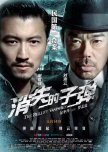
The Bullet Vanishes is one of the better Mystery/Crime films produced in China in the recent years. The plot was so solid and quite twisty. The film was a long mysterious journey to catch the “ghost bullets” shooter with one of the smartest and brightest detectives in that era. I have to mention that I loved the use of the 30’s period as setting. The cinematography and directing deserve loud claps; Lo Chi Leung did a splendid job with this film’s visuals.
Throughout the whole film, you will find yourself wondering about the criminal’s way of killing; he’s one smart murderer who uses the technique of “Ghost Bullets”, the bullets that kill but then disappears. The curse and the fantasy side come to light as the most probable solution for this difficult case but detective Bao and detective Guo decide to go through a mysterious journey to uncover the killer’s trick as well as his identity. What also attracts the intention and worthy to be mentioned is the reality of events; although there were action sequences, none of them was exaggerated in a way that would seem fake which is extremely appreciated. I like action movies that keep it real.
This film is an absolute crime thriller that’s full of mesmerizing suspense and genius mystery built up that made the journey quite exciting and intriguing to follow. Throwing significant hints every once in a while was a major strength point that counts for this film’s screenwriting. You may find yourself comparing this to Sherlock Holmes’ films at many occasions.
The acting was High-Class. I am familiar with Nicholas Tse and as usual, he didn’t disappoint; that guy’s charisma is no joke while the veteran Lau Ching Wan was absolutely great for this role. The characters ’involvements in the events’ development deserves the praise; every character in this film had its own role in the mystery/suspense built up and the search for the truth. They created magnificent harmony that gave the plot a great appeal.
I am not saying that this film is perfect by any mean since it had its own clichés of paring an experienced detective with a younger hot-shot or the somewhat “stolen” twist at the end but that doesn’t deny the fact that this is a great detective thriller.
Watch this if:
-You like Crime Thrillers that are full of suspense.
-You like hardcore mysteries that keep you wondering all the way; this is a film created for mystery lovers.
-You’re in the mood for a dark and intriguing story.
-You’re in a mood for a great detective/investigation ride.
-You like Nicholas Tse; his fans shouldn’t miss this one.
Do not watch if:
-You dislike stories that focus on mystery built up more than anything else.
-You’re looking for a light film. Although there’s romantic interest, it’s absolutely meaningless for the film’s general vibe. In my opinion, it was useless for this type of film.
In the end, I can only say that this film is a thriller ride that relies on a well-written mystery which I believe it was very intriguing and fun to follow despite its flaws. It gets a well-earned 8,5/10 from me.
Was this review helpful to you?

We’re all familiar with the Japanese sense of creativity that knows no limits and this film falls under that category. Takeshi Miike is surely a genius director but he comes up with pretty crazy films sometimes, that’s why I understand people who think of this as unwatchable and I also relate to those who consider it another creative work. What’s for sure is that this film isn’t directed for everyone.
This is basically a school film; one of those J-films where there are lots of delinquents and a badass male lead and of course, there’s a little romantic interest as a spice. But then things get ultimately awkward and irritating when they add singing and dancing to those elements. I don’t know what this film’s makers were thinking about when they did that. I thought that they were trying to imitate a Disney musical or something but if that was the case, then this was a drastic failure. I believe that the film would’ve been more enjoyable if they excluded the meaningless singing and dancing, I had to skip those parts to be able to follow the story and that was somehow successful. But then again, you can’t consider this as a pure delinquent film since it was interrupted with pointless romance without any chemistry that grabs your intention.
The acting was pretty alright. I mean there’s Satoshi as the male lead and let’s not forget other good actors such as Sakura and Ihara who were quite good as actors but I can’t say the same about any character in this film, most of them were all over the place especially the female lead who was utterly annoying and badly written. So you can guess that this is a film where you have to set a thin barrier between acting and characters; even though the former was quite good, the latter was a hot mess.
The music department was extremely bad, I do believe that it ruined the whole film no matter how much you try to ignore it; it will pop out in front of you out of nowhere to destroy any sort of entertainment you expect from this film. I think this is the worst musical film (if that what the makers were trying to accomplish) ever made.
Taken as a whole, I wouldn’t dare to recommend this to anyone because I am sure that most people would hate the frustrating singing and dancing but if you can disregard those elements and watch this as another weird school/delinquent J-film mixed up with some romance then this could be to your liking. However, remember not to have any expectations for this one or else, you will end up awfully disappointed.
Was this review helpful to you?
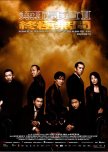
The first film felt complete but that didn’t stop producers from creating back stories as well as future presumptions and inserting other characters in both Infernal Affairs II and III to make everything sound finalized and perfectionist. Maybe that’s overdoing it but I still wouldn’t consider it wrong.
Infernal Affairs III picks up after the first movie; it shows the life of the remaining character after the last outcome of Infernal Affairs but that doesn’t deny the fact that the first movie’s characters were back in flashbacks to tell a different back story that felt more spiritual than twisted. What makes the matter more complicated that the search for moles inside the police isn’t over yet. This time around, it’s two cops tailing each other in the most twisted suspenseful way.
The screenwriting didn’t lose its touch; it managed to bring great Suspense/Thriller moments even with flashbacks and past moments. Of course, the flashbacks I am talking about aren’t extracted from the two previous movies; they’re specifically made for Infernal Affairs III to give it more depth and a proper back story for the few new characters introduced in this movie. The plot was interesting to follow even if it wasn’t twisty as the first two movies.
As Tony Leung, Andy Lau came back to lead this movie (unlike the second Infernal Affairs), the acting department felt extremely satisfying and with the addition of Lai Leon, it felt like perfection when watching those three around. Of course, Anthony Wong and Eric Tsang are like pepper and salt for the Infernal Affairs trilogy.
The characters’ development was quite appreciated; Ming was really twisted with a pretty convincing turns in here; I was quite surprised by the last twist for his character. The new characters added a great taste to this movie especially Yeung who made me suspect him and sympathize with him at the same time. I think that’s the strength point of both Infernal Affairs II and III; the screenwriters added intriguing characters who don’t allow you to complain about the pacing and characters’ conflict after the outcome of the first Infernal Affairs. What I didn’t appreciate was the somewhat forced addition of Yeung’s character in the past stories when it’s obvious that he wasn’t even mentioned once in the past two movies. Also giving Dr. Lee a bigger role in this movie was unnecessary in my opinion.
Infernal Affairs III is worth the watch if you saw the other two but you can also watch it right after the first movie without looking into the second one since the latter isn’t related to this film’s plot in any way.
Watching the Infernal Affairs trilogy back to back as I did was one of the best things to do when you want to watch all the sequels but watching Infernal Affairs only like many others did isn’t the wrong thing to do but you will be missing two of the better characters’ addition: Hau and Yeung. That’s why I still recommend it as a trilogy.
Was this review helpful to you?
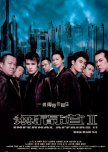
This is practically a prequel instead of a sequel; we get to go in depth of Yan and Ming’s past as well as Sam, Wong and many other characters. So you can guess that this movie will explain the beginning and the background of our characters. As much as I hated the premise at the beginning, I came to enjoy it afterwards because of one reason only: The idea was pretty well executed!
The writers succeeded at making the past stories interesting even though we know all of their destinies. The main reason why this movie felt intriguing to watch is because of the new obstacle that the screenwriters were successful at integrating it without ruining the future story (what we already know from the first movie). The fact that the younger Yan has to spy on his half-brother as his first mission was really absorbing. And let’s not forget the gangs and the fights to take over the reins of Hong Kong’s triad.
Just like the first Infernal Affairs, this movie had absorbing action, good thriller as well as pretty cool suspense which I highly appreciated it. Just a heads up though, I believe that this movie was more violent than the first one but I still wouldn’t consider it a “Violent movie”.
The negative point that I found about this movie’s storyline is the fact that we know almost all the characters’ destiny from the first movie so no matter how hard the screenwriters tried to manipulate their fate, we would know that nothing will happen until it’s the first movie’s era. I thought that was somehow handicapping on the suspense level.
Now let’s talk about the acting, Yue Shawn and Chen Edison can’t be at the same level as Andy Lau and Tony Leung but they were surprisingly convincing. I do believe that they did a good job as the younger versions of Yan and Ming. Besides, Anthony Wong and Eric Tsang were left untouched which was relieving. As for the added actors, they were also good enough.
The characters were well-written. The younger versions of Yan and Ming were nice to follow but I must admit that the younger version of Yan was way more interesting than Ming’s no matter how much you think about it. That’s because Yan was involved with his half-brother Hau, who I believe is the best written character in this movie and the reason behind its fascinating events. Hau is such an attention-grabbing character! He’s so calm, intelligent, well-mannered and never acts without thinking twice. He’s the villain alright but I never managed to hate him; actually, I came to love the way his character was executed. So the fact that Yan was spying on him was highly cool to watch. Other than that, there were other characters that I didn’t appreciate their addition especially Mary who ruined Ming’s character for me.
Basically, if you saw the first Infernal Affairs then you should give this prequel a shot. You will be able to understand the characters’ motives and you will get to know many behind stories as well as new events that will keep you interested.
Was this review helpful to you?
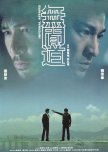
It’s true that the American version has better visuals because…duh, it was produced four years after Infernal Affairs but the original remains the best. Anyhow, I am not here to compare both versions; let’s talk about this movie.
Infernal Affairs is about the underground world, the triads and the moles. This is probably the best undercover story ever written; the developments created a race against time to reveal the moles within the gang and the police. This is a fast paced rollercoaster ride with many twists and turns that will keep you at the edge of your seat. The suspense element was flawless but the mystery built up was somehow lacking that’s why the storyline didn’t manage to get the perfect score.
Like any other action movie, this one contains violence and brutal killing sometimes but I wouldn’t categorize it as a violent movie. This is basically a thriller-crime mixed up with well-made suspense with the undercover theme as its center.
The acting was quite remarkable, with Tony Leung and Andy Lau as main leads you’re bound to expect something with quality and they surely didn’t disappoint. They were both great in portraying their role and delivering feelings; nothing less from two of the best actors in HKC productions. Other actors like Anthony Wong and Eric Tsang were also quite good and pretty convincing.
This movie’s characterization was the major strength point beside the clever writing of course. I wouldn’t be exaggerating if I say that all characters will be able to to get your full intention whether they were the good guys or the villains. The writers succeeded in creating top-notch characters’ development that will make you relate with each and every one of them.
The music was fitting for a suspense thriller movie; I also liked the “Shi Shey” song that was played in the background, it was really calming.
Watch this if:
-You’re looking for good suspense thriller with unexpected twists and turns.
- You’re fond of undercover themed stories.
- You’re in the mood for good screenwriting and compelling storyline.
- You like Andy Lau, Tony Leung or both them. This shouldn’t be missed for both of their fans.
Do not expect:
-Happy ever after ending.
- Romance.
All in all, this movie is wonderfully made since it can draw you into the world of darkness and make you strongly attached to its characters and events. If you like the genres, I can guarantee that this movie will manage to move you one way or another.
Was this review helpful to you?

The plot is centered on the Japanese upper class in 1912, an era that’s very rare to find in Japanese or Asian productions in general which made me appreciate its use. Although the beginning was a bit slow, the love story was done quite well and let me tell you, this is not one of those cheesy stories where everything gets resolved with “I love you” and “I love you too”. This is a mature romance that goes in depth of emotions and struggles to reach its peak. While watching the romantic developments, you will get a taste of flowing innocence, painful denial, endless suffering, forbidden encounters as well as hunting desire that led the storyline into dark yet enjoyable corners because it was one of the basic chapters of this movie.
The story’s developments weren’t always right or very well done. Actually, some of them felt predictable and quite bothersome to follow such as familial quarrels and the barriers against the main leads’ relationship. However, if we judge it by the overall atmosphere; the screenwriting was able to pull it off and create a pleasant and mature love story.
The acting department was almost flawless. As usual, Tsumabuki Satoshi was able to get complete control of his role like he always does; that guy is an astonishing actor indeed. It doesn’t matter what kind of role you give him, he will manage to shine in it no matter how badly written it is. On the other hand, Takeuchi Yuko happens to be an expert in romantic stories. Of course, I am not denying her acting skills but if you saw her other romance oriented productions, you will notice that she always manages to create gripping chemistry with her partners and this movie wasn’t any different.
Spring Snow is all about chemistry, so if Satoshi and Yuko didn’t pull it off the way they did; everything about this movie would’ve fallen apart. It was so consuming and very different from other Japanese productions; from now on, that’s how chemistry is supposed to be done. Moreover, the characters’ development was quite neat and enjoyable overall even if some of them felt quite messed up at times.
You should watch this if you’re looking for mature romance, great acting and astounding chemistry. Needless to say, if you’re expecting something fluffy and cute then you’re definitely in the wrong place.
Was this review helpful to you?

It’s a shame that this drama didn’t get the right international attention despite the fact that this is one of the best produced K-dramas back in 2012.
This is a journey in the harsh world of political schemes and the higher ups power struggle where the jungle law is effective: “the strong consumes the weak”. However, a man defies that law and starts his own journey of justice to defend his beliefs accompanied by fellows and confronted by whoever who gets hold of power. The Chaser’s screenwriting is almost flawless if we exclude some events, nothing less from a genius writer named Park Kyeong Soo who never fails in delivering delicious witty dialogues full of wisdom quotes. The thrilling events will keep you at the edge of your seat; just get ready to throw yourself into a ride of consuming twists and endless turns because that’s the core of this drama: Extremely Intense screenwriting.
If I have to talk about acting, I would say it’s high-class and very penetrating especially the main leads’. With veteran charismatic actors like Kim Sang Joong and Son Hyun Joo, you’re bound to expect perfect roles’ portrayal and astonishing acting skills. Other actors were also fitting and quite enjoyable to watch.
As for the characters, you will find yourself compassionate towards the protagonist and not hating the evil figure mainly because he succeeds at making you understand his motives. The rest of characters were appreciated especially their development but if I have to mention the most absorbing character in this drama, I would say Chairman Seo Dong Hwan. He had such a complex character that can be described as a man of wisdom, who represented power but those qualities can also be interpreted as filthy power and misleading wisdom.
It's a given that intense dramas with several twists would lose its factor of surprise once it's rewatched that's why its value is low.
To summarize, you should watch this if you’re looking for a good thriller, unique plot, cliché-free storyline, top-notch acting, powerful screenwriting and deep characters. However, if you’re searching for a romantic plot, cheesy events, light drama or idol actors then you shouldn’t be reading this in the first place.
Was this review helpful to you?
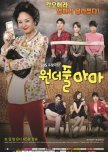
I don’t watch family dramas because they’re not my cup of tea but this year I came to watch two family dramas at the same time; this one and ‘I Summon You Gold!’ because of a long story that I won’t trouble your ears (or more specifically your eyes) with.
So what is this about? It’s one of those lengthy Kdramas produced in a non-stop way every year. It has all the elements that a family drama should have such as familial struggles, birth secrets and old respectable figures. There are also light romantic stories that owned about half the drama.
If I had to state the facts, I would say that this drama’s screenwriters weren’t good enough to make the drama interesting until the very last end. It’s a given that Korean family dramas drag and contain many filler episodes but despite that fact, the drama was deliciously entertaining until the 39 or the 40th episode when the writers tried to get smart by adding some twists to the storyline, but guess what? It was an epic failure because… hello!! Family dramas don’t need stupid twists to be good; it needs a complete control of the run time by using the family theme. Furthermore, the screenwriters conducted a mess by cutting off characters without a previous notice or a proper explanation. They also threw meaningless hints and rushed things out at the end; okay, I won’t make them bear all the blame for the last part since it’s not their fault that the drama was cut short to 48 episodes instead of 50 but still, they could’ve made a proper ending considering the fact that this is a long drama.
The cast was reasonably fitting and well chosen. There were some really good actors in here but I can’t say the same about characters since some of them felt all over the place at times. However, the characters’ development was remarkably magnificent.
Now, if I have to state my subject point of view, I would say that this drama was enjoyable overall even with its shortcomings. And that’s coming from a person who doesn’t (as never) watch long family dramas.
In conclusion, I won’t advice anyone to watch this or not because that’s up to you to decide. Just keep in mind that this is a long family drama with notable screenwriting issues that needs a strong commitment and a long breath to finish, but it also has a nice set of cast and it can be somewhat pleasant to watch.
Was this review helpful to you?
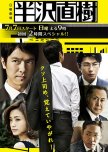
Hanzawa Naoki is the kind of dramas that bumps of the crowd to keep you at the edge of your seat through its astonishing screenwriting, gripping events and high-class acting. This drama didn’t get the highest rating in modern times for naught. It was well worth it from any angle you look at it. You may be wondering: what’s so special about this drama that made people go crazy over it in Japan while the international audience couldn’t care less about it? To find out the answer I had to start this adventure and jump into a world I am not very familiar with: The world of business, bankers and salary men.
Hanzawa Naoki deals with the world of banks which is a non-famous theme for Asian dramas. The story brings the harsh facts about that world to light while focusing on the intense fights that the male lead has to go through in order to survive in that field without abandoning his ideals. What this drama outshines at is the stunning screenwriting and the solid characterization; the storyline was so involving with many twists and turns that will make you eager for more. The smart writing managed to make the events flow by in a thrilling and gripping way without being heavily present or irrationally exaggerated. In terms of directing, I would say that this drama’s business theme was perfectly expressed whether though the well-made cinematography or the nicely chosen shooting angles.
The acting department in this drama was superb; every actor pulled his role in a great way. Extra credits to one of the most phenomenal actors in Japan: Sakai Masato. That man’s acting skills are no joke; he can pull off his roles in a brilliant way and his Hanzawa Naoki’s portrayal is the best proof; he’s a genius actor indeed. And since we’re talking about acting skills, I have to mention the second best actor in this drama: Kagawa Teruyuki who was super amazing as Owada.
Speaking about characters, Hanzawa Naoki owned the show and no one succeeded in stealing the spotlight from him. He’s an overwhelming smart character that will make you absorbed in his intelligent choices and actions. He counts every situation he comes across and he’s always one step ahead of his opponents. Whenever Hanzawa puts the fierce look on his face and starts the “Payback”, get ready to be blown away by his unique way of flipping tables around. As for other characters, each and every one of them was important for the storyline’s development and the characters’ interactions that were beautifully accomplished.
Taken as a whole, I am fully aware why would everyone avoid this type of drama; it has a non-enjoyable theme for most people, no romantic plot and no idol stars as main actors, that’s why I am pretty sure it’s not directed for everyone. However, that doesn’t deny the fact that this is one the best made dramas out there even if it doesn’t get the appropriate attention.
Was this review helpful to you?
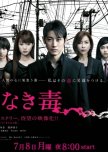
As a huge fan of twisted dramas, whenever I am looking for hardcore mystery; I always run to Japanese productions because they’re so professional at making those types of stories. Namonaki Doku is a mystery drama alright but it can never be considered an intense mystery.
The drama is divided into two big stories; the first one takes the five first episodes while the second one takes the rest of the drama. Namonaki Doku can be differently judged basing on the two stories which obviously contain two unrelated mysteries. The mystery build up in the first part was quite disappointing since it got a little amount of the run time and contained some slow events, but the facts revealing at the end was exciting and a bit surprising. As for the second part, the built up was impressive and rather interesting to follow that’s because the second mystery was deeper and relatively more twisted than the first one. However, its fact reveal wasn’t very outstanding.
Mystery in this drama flew like cool water; it can rarely make you jump of your seat despite the fact that it had a respectable amount of twists and turns. I am not saying that’s a bad thing but being used to hardcore mystery/suspense dramas; Namonaki Doku felt a bit unusual for me at first but at the end of the day, I realized that calm mysteries without many major flips and turns can also be thought-provoking in its own way, mainly because this drama handled some great psychological relations through its mystery built up.
This drama’s set of characters changed a bit between the first and the second story but our main lead was left untouched. Sugumura Soburo is nothing like other male leads in mystery dramas; he’s so honest and timid, he’s the kind of character that you can never imagine him solving other people’s problems and getting involved in big mysteries. That’s what characterizes this drama: An honest heartwarming man purifying poison in a non-sly way. The rest of the characters were pretty alright even if some of them weren’t very necessary for the story’s development. The acting was acceptable as a whole but some actors failed to deliver feelings especially in the first story.
Now let’s talk about the stunning music! It outclasses any other mystery drama’s music. I had to mention this strength point; the violin and the instrumental soundtracks were amazingly played at the right moment that I had to replay those parts.
As a last thought, I would say that Namonaki Doku is exclusively made for mystery dramas lovers but even so, I am sure that not all of them will appreciate it, essentially because it had a slow built up and it’s not considered an intense mystery.
Was this review helpful to you?
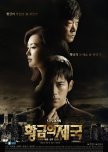
Golden Empire is simply gold but that gold isn’t for everyone to watch and I can fully understand why the audience would avoid a business/romance-free drama. Has it been a time when you were watching an excellent drama but you find out that most people are ignoring it and the internet buzz is almost inexistent? That’s my case with Empire of Gold.
If you want to watch this, forget about the synopsis; it’s misleading and makes you expect things you shouldn’t. This is a story about power struggle for 20 years in order to rule the golden empire which is Sung Jin Group that’s owned by the Choi family. The three main warriors are: Choi Seo Yeon; the daughter of Choi Dung Sung who’s the owner of the group, her cousin Choi Min Jae; the son of Choi Dung Jin who’s the co-founder of the group and Jang Tae Joo who built himself from scratch and came to win the Empire of gold.
Out of all currently airing Korean dramas I was watching synchronously with Golden Empire; this one managed to to snatch the top spot and remain as my top obsession all the way through; this drama excels in screenwriting and witty dialogues, this is a drama where billions were flying on the dining table and a cup of tea can decide someone’s destiny: Yes, I had to mention that because once the table is set for a cup of tea, you should know that you will be blown away by the characters’ dialogue. What I like the most about their dialogues are the metaphors, the quotes and the historical events that they use to deliver their ideas whether directly or indirectly that’s why I always thought that this drama’s writers are geniuses; not only they wrote amusing discussions but they also provided us intense thrilling events and intriguing twists without any drop of slow moments that can reduce our intention: loud claps for the most brilliant writers in Kdrama's history.
The acting department was simultaneously stunning; Go Soo, Lee Yo Won and Son Hyun Joo are astonishing actors that I can’t imagine this drama without them. Jang Tae Joo, Choi Seo Yeon and Choi Min Jae are equally alluring, smart and impressive; just get ready to cheer for them, hate them, love them, distrust them, pity them, curse them but the most important thing is that you will feel them. They led this drama and made the excitement within its storyline through the alliances, the schemes and the conspiracies that were masterminded by those three or the rest of the cast who were equally convincing as actors and highly appreciated as characters.
In a line, I want to give credit for the music that suited this drama’s business theme in a magnificent way.
The rewatch value is low because such an intense drama will lose its twists and the factor of surprise if it's rewatched.
To make the long story short; this drama isn’t directed for everyone but one thing’s for sure, it’s unlike other same-plot dramas since there are no cheesy moments, weak characters or shallow acting. This is a high class screenwriting that’s very rare to find in Korean or Asian dramas in general.
Was this review helpful to you?

The presumption of revenge was something attractive and I can say that it was executed quite well in this drama; without doubt this is not the best revenge drama out there but it’s definitely watchable for the revenge theme. The story starts off slow; the first episodes felt like fillers without many events going on, then things started picking up little by little, the plot started building up and the premise began to show up. However, this is not so different from the usual melodramas out there since elements like the scarred past; the troubled family, the typical evil guy as well as the teary female lead were present. What was added here was the little mystery, suspense and some thriller moments that flipped the tables occasionally and created few great twists every now and then which I have to give writers credit for making them happen but still; there weren’t any amazing turns of events that would make you jump of your seat considering the fact that most of them were pretty much predictable.
Do not watch this because of romance; the whole concept wasn’t catching at all even the little moments between the leads were sometimes overdone and not well matched with the story’s development. I believe romance was one of the storyline’s weak points.
Another storyline’s weak point: The ending since it was very strange; let’s stop there. It took me a while to figure out what the writers were thinking and then I concluded that they weren’t thinking at all.
The acting was good; Kim Nam Gil proves once again that he’s very suited for revenge dramas, Son Ye Jin had a nice performance too but I can’t say the same about her character. The rest of the cast were good too; nothing to complain about, only that their characters weren’t captivating enough probably because Yi Soo was always in the spotlight and no one managed to take it away from him.
All in all, this drama had potential to be much better than this. Nonetheless, it’s still very recommendable for revenge dramas lovers but make sure to lower your expectations, expect the unexpected and never forget that you’re about to watch a MELODRAMA.
Was this review helpful to you?

























